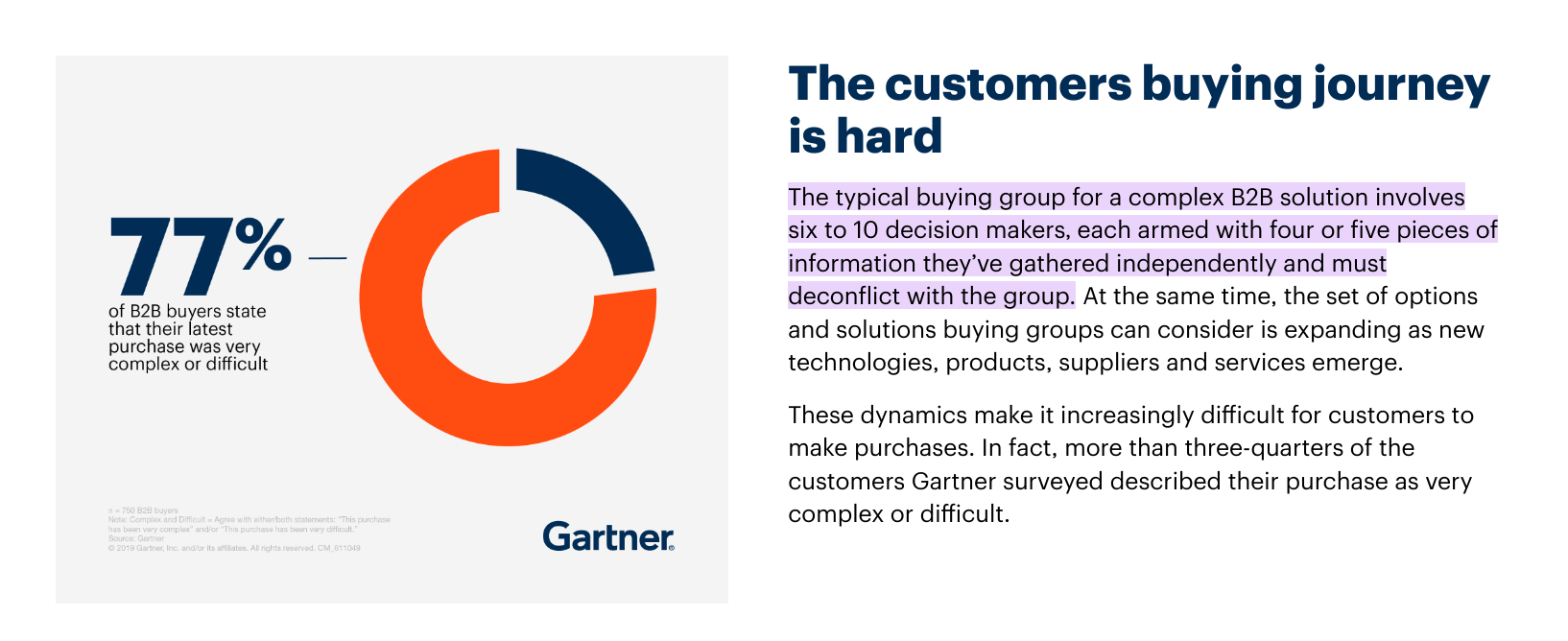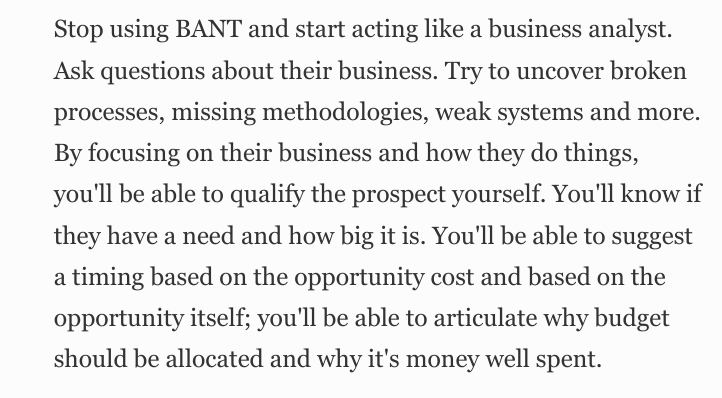
B.A.N.T. is an outdated sales framework. It's destroying MSP close-won ratios. It's wasting time and investments in lead generation.
If you aren't familiar, BANT stands for Budget, Authority, Need and Timing.

I'll start with a true story of how BANT hurt an MSP and then I'll share why I believe each part of the framework is just plain bad.
I was in a meeting with an MSP president that is not a customer of ours. He has just over 20 full-time employees and they are Microsoft Silver partners. I learned they had recently parted ways with an outbound lead generation services firm.
"We got some appointments [with prospects] but none were in any pain...they weren't willing to switch. These appointments were a big waste of time. It wasn't with the right person in most cases."
Later he shared the types of questions he asked during first appointments with prospects. He pasted them into the chat window.
- Is IT important to your operations?
- How many computer employees?
- Are you using Windows or Mac?
- Do you use any Vertical Programs in your business?
Here are the results: over 45 booked appointments in 18 months, only about half took place at all, and for the appointments that did occur, not one converted into a customer.
Triple ouch.
First, not enough appointments were booked in 18 month. The second booboo: a 50% ghost rate for appointments is no bueno either.
Something was broken. Was it an untrained person cold-calling? A crack(s) in the process somewhere? An inefficient legacy sales techstack that's ruined the BDR's activity level? Who knows. But one thing's for sure: low appointments and a high ghost rate are the fault of the lead generation firm.
But here's the third problem. The MSP met over 20 qualified companies and not one converted! And given the nature of the questions asked during a first appointment, it's painfully obvious that the MSP has a sales process problem.
The MSP was using BANT (or something along those same lines) and it failed.
Why does BANT suck? Because it's seller focused. The MSP fails to bring value to the prospect.
"Is IT important to your operations?"
Come on!
BANT says we need to bring up budget with the prospect early on. The budget questions assesses whether the prospect has the financial resources to make a switch. The underlying principle suggests that if there is no budget, it's not worth your time to pursue a sale.
However, if a prospect recognizes sufficient value in an offering, they will find a way to allocate the necessary funds.
For example, if someone has a headache and I ask them how much they'd be willing to spend to fix it, they might reply $5 or whatever the cost of ibuprofen. On the other hand, let's say they went to see a doctor after repeated migraines and after some tests, it's determined to be a tumor. A gloomy example, I know.
But, has their budget changed? Absolutely.
The real problem was discovered (thank you, doctor) and the value of the treatment is almost priceless now.
Bottomline is that trying to qualify based on a direct budget question before identifying the depth and breadth of the potential value of your services is sales suicide. Budget can fluctuate depending on the value and the timing put forth.
Budget questions in a first appointment put the buyer in the driver's seat too soon. If the company has enough full time employees, they have enough resources to managed IT. They can re-allocate budget so long as the value to their business is there.
Unless your MSP is targeting start-ups or companies with less than 25 people, it's crazy to expect all sales processes to go through one decision-maker.
Managed Services is not a commodity (or at least, it shouldn't be). It's a big deal to sign a multi-year contract and you know that better than anyone else. The priorities for the CEO, COO and End-Users differ big time when it comes to technology.

A different MSP shared this great story with me a few months back.
"We like architectural firms. In fact, we have 12 firms in architecture and have learned what matters to them. For example, a smaller firm reached out to us -- they were prospects. They had learned that we already support a larger & more prominent architectural firm (3x their revenue). We proved to them we know their business. For example, how when that large firm came onboard they used Revit, it's memory intensive software and requires high grade video card, and they had a proprietary box builder that took 6 months to build and cost $9K per box. So we found a local alternative that cost only $6K laptop and $7k desktops and we could get it to them in just weeks. After that hearing that one story they wanted to know where to sign..."
Had the MSP asked the small architectural firm "how satisfied are you with your current IT services?" do you think they have switched MSPs? Probably not.
Customers don't know what they don't know. It's the salesperson's job to understand the needs better than the customer does and to be prepared to find it and show the value of solving it.
Similar to the budget question, the timeline is something that isn't static. If the value of the switch to your MSP outweighs the cost of the contract penalty, then the timing to switch is sooner.
Keenan, author of Gap Selling, said it best. We should act less like a sales person and more like an analyst or doctor. Stop expecting the prospect to bend over backwards to help you land a sale.

Once a week or so we send an email with our best content. We never bug you; we just send you our latest piece of content.
